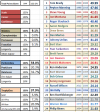As much as I like bashing Peyton, the point of a statistical model is generally to tell you something you don't already know. Manipulating the model until it lines up with all your preconceptions means it's kind of worthless by definition, since you started with the desired conclusion and worked backwards so it would tell you what you already thought in the first place.
The first model that was basically 1:1 with HOF induction, and who was an edge case toward the bottom, was great because it was based on the model lining up with a real world outcome, not the feelings of the model maker.
Good post. I don't think there's really any such thing as a final objective rankings; as I stated in the first post, the Hall of Fame monitor closely aligns with Hall of Fame criteria. That doesn't make that list particularly valid for greatness, though, which was apparent with some of the ordering. It's supposed to be an open, adjustable ranking tool that allows for these configurations based on people's opinions, but the interesting thing about it is that you must apply criteria to all; I've purposely avoided any types of poison pills that would only effect a few players. But in terms of bashing Peyton, feeling strongly that one player
should rank above another is really the entire crux of how these systems are built. You have to look at the values and adjust according to your thinking.
The Peyton criticism/hate/bias is good because there is
some validity to it, and that forces you to work out exactly what Peyton doesn't have that others do have. The playoff win differential, with some increased weight, does a better job of accounting for that stellar postseason that we associate with Staubach, Starr, etc., which is why people thought they should rank above Manning. In addition, much of Peyton's greatnesss, or I should say the greatness that puts him over guys like Montana or Staubach, is due to longevity over efficiency. By recognizing these two adjustments (stronger efficiency weight, stronger postseason win differential rate) it allows for more adjustment options.
That being said, you can see down the list that there are consequences of ramping these up. If de-ranking Manning is that important to you, you'll have to also explain how Patrick Mahomes should be ranked above Brett Favre or Fran Tarkenton. So, it isn't really a valid list in my opinion, but it's a start...maybe too extreme.
I also don't know that I'd use raw passer rating for anything, only era-adjusted.
I agree. I've largely gone away from this. But the original Hall of Fame rankings I posted had a 50/50 mix of era-adjsuted and non-adjusted passer rating scores. By decreasing the era-adjustment, it tends to favor the players who are closer to the modern passer as we know it,
EDIT: Other random thought is that it may simply not be worth it to try to have the model go back to the 1940s or whatever. Like if you make a model that works for everyone who played in 1967 on, or even 1978 on, but not for the old timers, you might just want to say "to heck with it" and drop everyone who played before a certain cutoff because the game itself was just too different back then.
I had posted a few pages back that there's a confidence index now as one of the settings, and it fades out the performance scores of QBs starting in 1967 and works it's way back, in an attempt to balance all kinds of problems with historical QB stats, historical QB record keeping, and the major changes to the position itself. Here's a quick example; if you look at the left column and see "Confidence" is at 150%. Now look at Sid Luckman moving from top 8 to 13, Baugh moving from around 10 to 23, and all hte other all-timers out of the top 25. If you cranked up the level to like 300%, you'd get rid of all these guys.
























